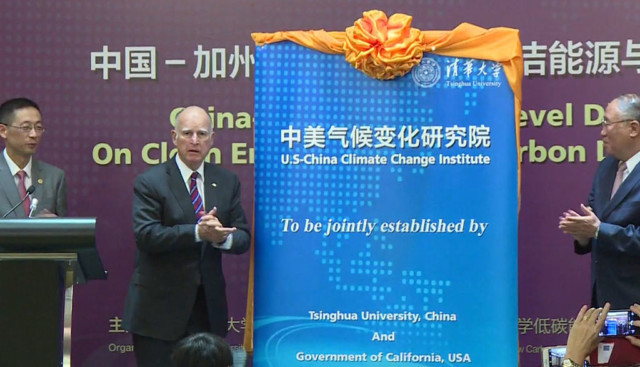The fight against climate change has taken some big hits in the U.S. as President Donald Trump continues to dismantle environmental regulations and policies.
China, on the other hand, is aggressively moving forward to reduce carbon emissions by increasing renewable energy sources, much like the state of California, which has always led the green tech movement.
So it makes sense that China and California are increasing ties to work together, often times leaving the U.S. government out of the conversation.
CGTN’s May Lee has the story.
Two years ago, the first U.S.-China Climate Leaders Summit was held in Los Angeles resulting in some historic commitments to reduce carbon emissions.
But that was then, this is now.
The U.S., under President Donald Trump, is reversing course by rolling back federal environmental regulations and pulling out of major agreements including the Paris Climate Accord.
The state of California is fighting back by forging unilateral partnerships with other cities and countries including China.
“I think the Chinese government totally gets it, and our government here in California does, and we are trying to go ahead without Trump, without the federal government,” said David Pettit of the Natural Resources Defense Council.
California Governor Jerry Brown has emerged as the defacto U.S. envoy on climate change. Earlier this year, Brown met with Chinese President Xi Jinping to discuss solutions.
Mary Nichols serves under the governor as head of the California Air Resources Board, the state’s clean air agency. She admited the leadership role by the U.S. on climate change is evaporating.
“The Paris Accord came about because President Obama reached out to China, but the two countries together brought the rest of the nations of the world to the table and got that agreement,” said Nichols. “With the United States now with a leader who wants to pull away from that role, there is this vacuum.”
China is willing to fill that vacuum. It’s crushing the U.S. in renewable energy including solar, wind and hydropower.
Earlier this year, China set a goal to meet 20 percent of the country’s clean energy needs by 2030. Good for the environment, but also good for the economy.
“Clean energy– it’s a trillion dollar, worldwide market. And Trump who calls himself the great deal maker is giving it to China for nothing,” said Pettit.
And China is all in. It’s pledged at least $360 billion in renewable power generation by 2020, which will create more than 13 million jobs.
But China, alone, can’t win the war against climate change. Experts say everyone has to join the fight.
“When we look at the numbers globally, if India doesn’t begin to join the party here, we still won’t make it,” said Nichols. “The more we understand the science of global warming and what the possible solutions are, you really can’t do it without bringing in the entire world.”
 CGTN America
CGTN America

